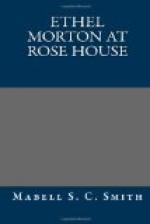When quite near the thicket, however, her slow steps quickened into a run. Her sharp eyes discovered hanging from one of the trees over the heads of the children one of the large wasps’ nests which seem to be made of gray paper. It had caught Dicky’s attention and he had coveted it for purpose of investigation. Summoning his cohorts he had pointed it out to them and had urged them to bring it down. Each one had broken a stick; some had stripped off the leaves entirely; others had left a tuft at the end. In both cases the weapons looked dangerously destructive to Ethel, as she ran toward them and saw one pole after another swish past the home of the paper wasps and expected the colony to rush forth to defend their abode. With a cry of warning she bore down on them and with a sweep of her arms turned them all back into the open field. Dicky was indignant.
“What you doing that for?” he demanded angrily. “One more thwat and I’d a had it.”
“You don’t know what it is,” cried Ethel breathlessly. “You’d all be stung if there were any wasps at home. That’s their house and they get awfully mad.”
The children looked back fearfully at the object of their attack.
“You’ve had a narrow escape,” insisted Ethel, and then to divert their minds from what had happened she made them stretch themselves in a line and hunt for arrow heads all the way back to their mothers.
“Thith ith a funny thtone,” exclaimed Dicky, picking up a rather large oblong stone that had a groove all around its middle.
“It looks like Lake Chautauqua. doesn’t it? You know they say that ‘Chautauqua’ means ’the bag tied in the middle’.”
“Did the Indianth uthe it?” Dicky asked as he laid his trophy in Roger’s hand.
“I rather think they did,” returned Roger excitedly. “It looks to me as if this was a hammer or a hatchet. See—” and he held it out for the girls and James and Tom to see, “they must have lashed this head on to a stout stick by a cord tied where this crease is.”
“It would make a first-rate hammer,” commended James.
“The Indians didn’t manufacture as many of these as they did arrow heads, because, of course, they didn’t need as many. I rather guess you’ve made the big find of the afternoon,” and Dicky swelled with pride as his brother patted him on the shoulder.
When it became time to go home the Ethels offered to take the short cut to Rosemont and get the rubber tips for the children’s arrows.
“If we go across the field and the West Woods we come out not far from the stationer’s, and we can leave the tips up at Rose House on the way back so they’ll be ready for you to put on to-morrow and the youngsters can have the bows and arrows to play with right off.”
“Let me go,” begged Dicky.
“All right,” agreed Roger. “Be careful when you go over the railroad track, girls. Mother isn’t very keen on having Dicky learn that road, you know.”




